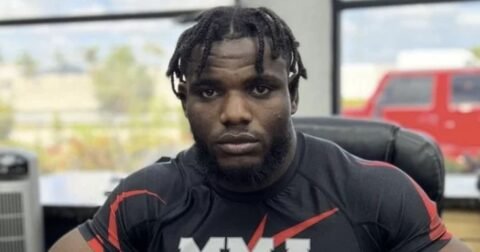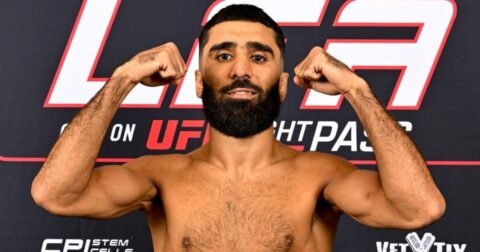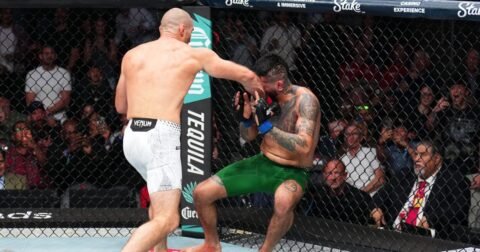
With UFC 225, the most stacked card 2018 has to offer about to go down, you would expect all attention to be firmly on this Saturdays event, however that’s not the case as the MMA world continues to debate the issue of early weigh ins.
The MMA fraternity has been in a flux since the revelation by UFC President Dana White that the promotion intended the scrap the early weigh ins and return to the previous model. White revealed the plan during a recent UFC unfiltered episode stating. “We’re getting rid of it. We’re looking at taking the weigh in back to the way they used to be. So, when guys weigh in at the fight, that will be it. That will be the real weigh in. We’re going to work with the commissions to get it done.” White attributed the pending changes to certain fighters attempting to manipulate the early weigh in system to gain a competitive advantage. “People started cutting it closer and closer and closer, thinking they can put more weight on because they have more time to re-hydrate.”
The early weigh ins were introduced two years ago, first visible in the build up to UFC 199, 4 June 2016. An earlier weigh in undoubtedly offers great benefits to the fighters who have enjoyed a greater period of re-hydration which has made the early weigh ins very popular among the UFC roster.
Despite its popularity the early weigh ins have been a statistical failure. During the two years they have been implemented 62 fighters have missed weight (MMAjunkie). In comparison to the two years prior to the implementation of early weighs in which only 32 fighters failed to make weight. A near doubling in the number of fighters missing weight under the new system have meant early weigh ins have unfortunately failed, despite their popularity with fighters.
The issues with the system have recently been exacerbated by two high profile cases of failing to make weight. Mackenzie Derns spectacular failure to make her contracted 115 weight limit for her UFC 224 match-up vs Amanda Cooper was well documented. Dern came in 7lbs overweight and forced the agreement of a catchweight bout. Soon after Darren Till would throw his hometown event in disarray by missing his contracted weight by 3.5lbs, sparking tense negotiations to take place which saw him surrender 30% of his purse to opponent Stephen Thompson and agree to make a fight day weight of 188lbs. With such cases becoming more and more common since the introduction of the early weigh, the UFC have decided to scrap the system and return to 4pm weigh ins.
The move has not went unnoticed, it has caused a huge stir in the MMA world with fighters, referees, industry experts and fans all offering opinions, many opposing the UFC’s decision, pleading with the company to maintain early weigh ins. Former UFC lightweight champion Eddie Alvarez led the way with various pleas through social media.
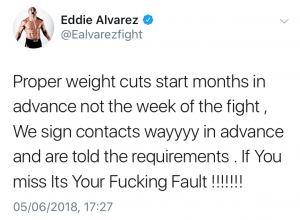

Alvarez was not alone with his calls for the UFC to retain early weigh ins. A whole host of fighters joined his campaign to keep the weigh ins which have allowed fighters the benefit of a longer re-hydration period.
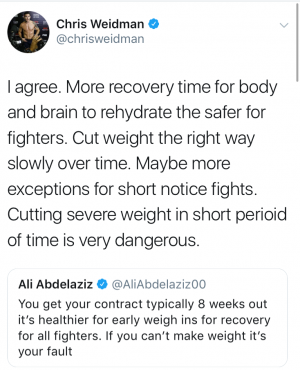
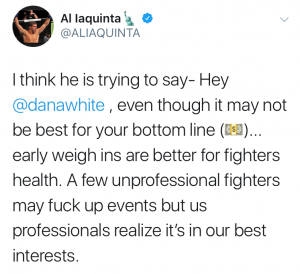
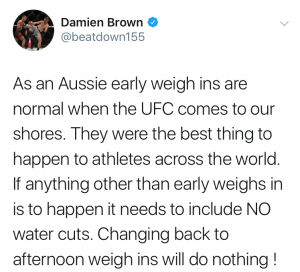
Some fighters have looked for alternative weigh in processes. Angela Hill proposed a longer weigh in period, which would place emphasis very much on the fighters to dictate their own re-hydration period. Whilst UFC veteran Matt Brown suggested the ONE FC model would eradicate the weight issue which has plagued the UFC. ONE FC use hydration tests to force fighters to compete at their natural weight classes and have taken weight cutting out of their promotion.

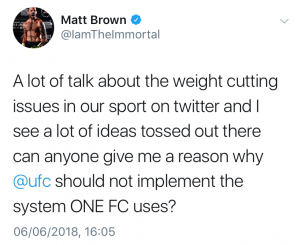
The early weigh ins although popular with fighters have unfortunately failed, with the amount of fighters missing weight significantly increasing since the introduction. With the UFC intent on returning to the unpopular afternoon weigh ins, we are now seeing fighters using their social media platforms in an attempt to persuade the organisation against the switch. Its clear something has to be done, although its also clear a return to the old model is not in the best interests of fighter safety. In an ideal world the fighters and the UFC will begin discussions about an alternative weigh in routine that would allow maximum levels of hydration and also reduce the amount of fighters failing to make weight. That scenario although ideal is very unlikely. The UFC have never been ones to negotiate with their athletes and will most likely impose their will on the fighters, signifying a return to the traditional 4pm weigh ins. In what seems to be a case of punishing the many for the actions of the few, fighters will now run the risk of being dehydrated for longer periods of time, with considerably less time to re-hydrate before fight night.




